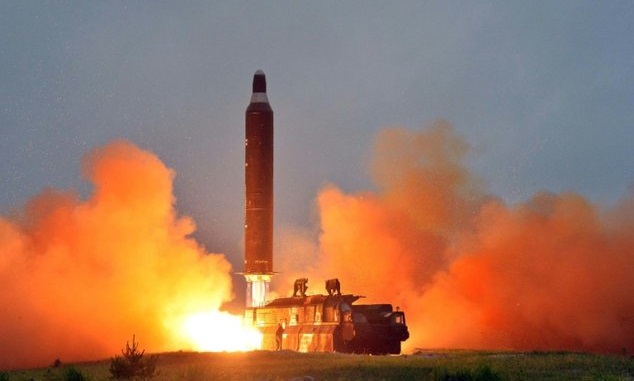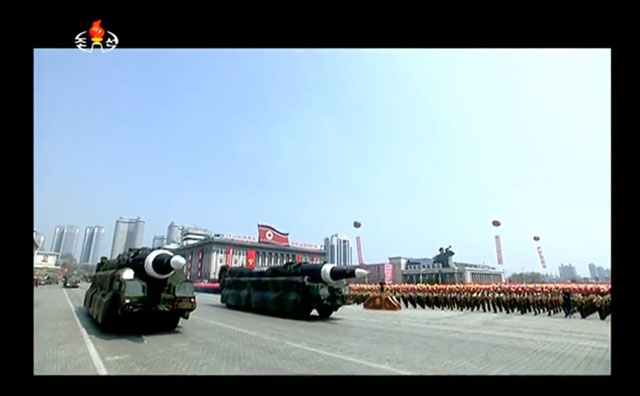
Seoul, South Korea | AFP | North Korea test-fired a ballistic missile Saturday in apparent defiance of a US push for tougher international sanctions to curb the Asian country’s nuclear threat.
“North Korea fired an unidentified missile from a site in the vicinity of Bukchang in Pyeongannam-do (South Pyeongan Province) early this morning,” the South Korean news agency Yonhap reported, adding that the missile “is estimated to have failed.”
The launch came just hours after US Secretary of State Rex Tillerson addressed the UN Security Council for the first time, called for a global campaign of pressure on Pyongyang — with China playing a major role — to halt its nuclear and ballistic missile programs.
“Failing to act now on the most pressing security issue in the world may bring catastrophic consequences,” he warned.
US President Donald Trump soon after assailed North Korea’s latest ballistic missile launch as a show of disrespect toward its ally China.
“North Korea disrespected the wishes of China & its highly respected President when it launched, though unsuccessfully, a missile today. Bad!” Trump wrote on Twitter a few hours after the failed launch.
In Washington, Tillerson repeated the threat that US military options were “on the table.”
Tillerson said China had “unique” leverage over its communist ally and neighbor.
But Beijing pushed back, arguing that it was unrealistic to expect one country to solve the conflict.
“The use of force does not solve differences and will only lead to bigger disasters,” Chinese Foreign Minister Wang Yi told the council.
His country, he said, should not be “a focal point of the problem on the peninsula” and stressed that “the key to solving the nuclear issue on the peninsula does not lie in the hands of the Chinese side.”

– Risk of nuclear attack ‘real’ –
Russia joined China in saying a military response would be disastrous and appealing for a return to talks and de-escalation.
Military action was “completely unacceptable,” Russian Deputy Foreign Minister Gennady Gatilov told the council. A miscalculation could have “frightening consequences,” he warned.
But Tillerson argued that diplomacy had to be backed with credible muscle.
“Diplomatic and financial levers of power will be backed up by willingness to counteract North Korean aggression with military action, if necessary,” he said.
“The threat of a North Korean nuclear attack on Seoul or Tokyo is real, and it is likely only a matter of time before North Korea develops the capability to strike the US mainland.”
Trump and North Korean leader Kim Jong-Un are locked in an ever-tighter spiral of threat, counter-threat, and escalating military preparedness.
The US is deploying a naval strike group led by an aircraft carrier to the Korean peninsula, and a missile-defense system called Terminal High Altitude Area Defense (THAAD) will be operational “within days,” according to officials.
North Korea meanwhile said it has conducted its biggest ever artillery drill and threatened to “bury at sea” the US aircraft carrier. Speculation has mounted it could soon carry out a sixth nuclear test.
#MaxThunder air combat training ensures the #alliance is maximally ready to defend the Peninsula against aggressors. https://t.co/vDGs7Avpwm pic.twitter.com/8NzQvSScUz
— U.S. Pacific Command (@PacificCommand) April 29, 2017
– China wants talks –
The meeting of the top UN body on Friday laid bare major differences among key powers over the way to address the North Korea crisis.
Over the past 11 years, the Security Council has imposed six sets of sanctions on Pyongyang — two adopted last year — to significantly ramp up pressure and deny Kim’s regime the hard currency revenue needed for his military programs.
But UN sanctions experts have repeatedly told the council the measures have had little impact because they have been poorly implemented.
Tillerson called on all countries to downgrade or sever diplomatic relations with North Korea and impose targeted sanctions on entities and individuals supporting its missile and nuclear program.
The United States is ready to impose sanctions on third countries where companies or individuals are found to have helped North Korea’s military programs, he said.
China instead wants Pyongyang to freeze its military programs in exchange for a halt to US-South Korean annual drills.
“Now is the time to seriously consider talks,” said Wang.
But Tillerson was blunt in saying it was up to North Korea to take the first concrete steps.
“We will not negotiate our way back to the negotiating table,” he said. “We will not reward their bad behavior with talks.”
The United States, Russia and China took part in six-party talks on North Korea’s denuclearization from 2003 to 2009, along with Japan, South Korea and Pyongyang.
 The Independent Uganda: You get the Truth we Pay the Price
The Independent Uganda: You get the Truth we Pay the Price





